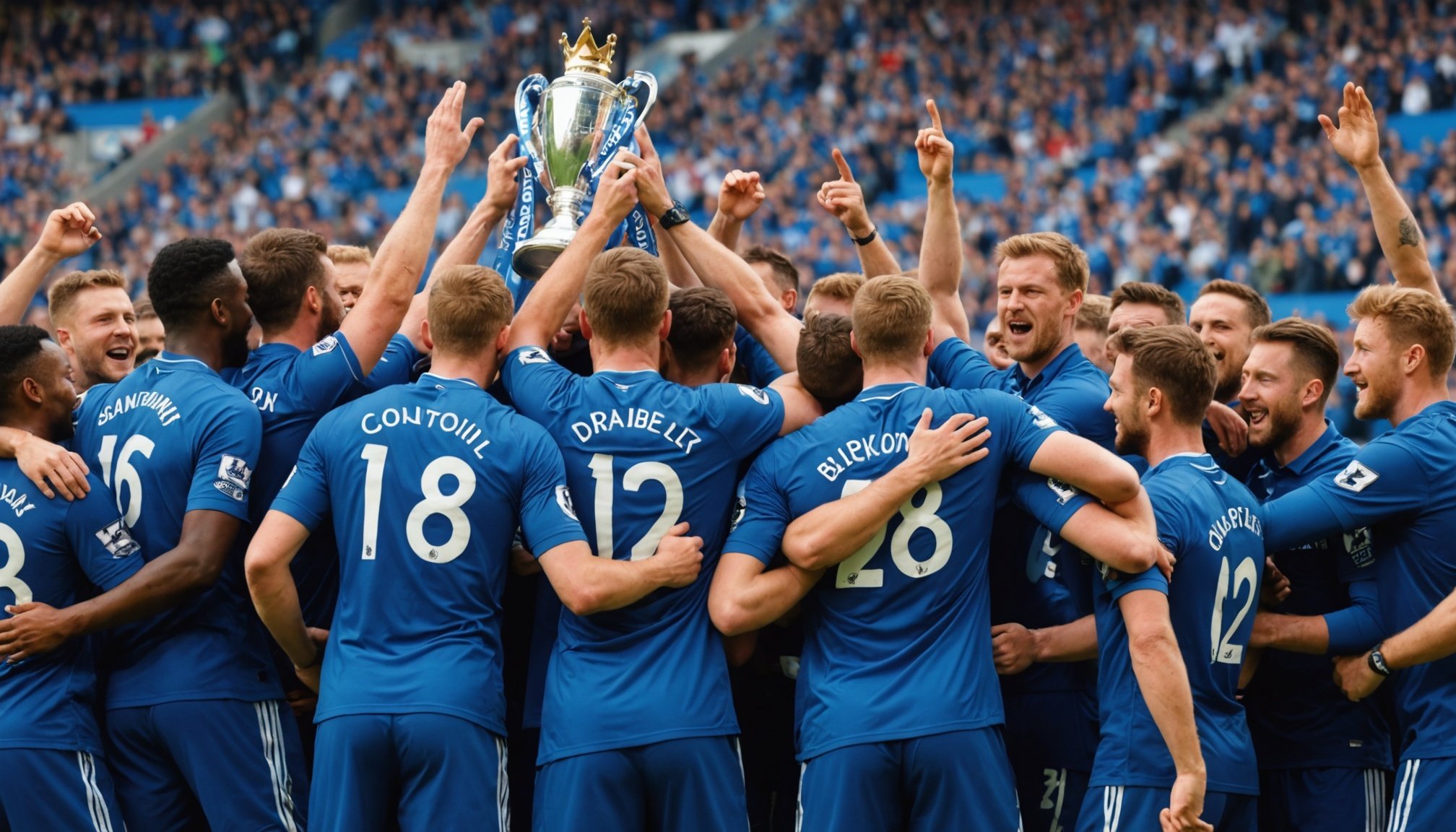Overview of Sponsorship in UK Sports Clubs
In today’s dynamic landscape, sponsorship strategies play a crucial role for UK sports clubs. With sponsorship acting as a primary source of revenue generation, understanding its current state is vital for clubs aiming for financial sustainability. Sponsorship provides much-needed funding, allowing clubs to invest in facilities, talent, and community programs.
The importance of sponsorship for financial sustainability cannot be overstated. It bridges the gap between limited ticket sales and government funding, enabling clubs to thrive competitively. This financial support often ensures that clubs can cater to both operational needs and strategic ambitions, fostering growth and long-term success.
In the same genre : Key components to design an effective training program for triathletes in the uk
Several key trends are influencing sponsorship decisions. Companies are increasingly interested in partnerships that provide them with not just visibility, but a deeper brand alignment. This means sponsors are looking for clubs that share similar values and target demographics. Moreover, there’s a trend towards more data-driven sponsorship agreements, where both parties seek measurable outcomes and clear return on investment metrics.
By staying attuned to these trends, UK sports clubs can refine their sponsorship strategies to better align with sponsor expectations, ensuring a mutually beneficial relationship that supports ongoing revenue generation and financial stability.
Additional reading : Key elements of a successful youth sports coaching program in the uk: unlocking potential through effective strategies
Building Strong Relationships with Sponsors
In the competitive realm of sports sponsorship, maintaining robust relationships is essential. A cornerstone of this is building trust through consistent transparency and communication. Open dialogue with sponsors not only fosters trust but also aligns expectations and goals, mitigating potential misunderstandings.
Ongoing sponsor engagement is equally important. By consistently engaging with sponsors, sports clubs can nurture deeper partnerships. Regular updates, exclusive insights, and personalised experiences can keep sponsors invested in the club’s journey and progress.
Moreover, leveraging existing relationships is a strategic approach for potential renewals. Clubs can encourage continued partnerships by highlighting past successes and future opportunities. Sponsors are often keen on sustained collaborations when they perceive long-term benefits and mutual growth prospects.
Effective relationship management requires clubs to adapt and be proactive in their engagement strategies. By paying careful attention to sponsors’ evolving needs and preferences, clubs can tailor their approaches to ensure both parties derive maximum value from the partnership. Ultimately, a healthy sponsor relationship is one where both the club and the sponsor see a shared trajectory for success.
Effective Marketing Communications
In the realm of marketing strategies, UK sports clubs must forge strong communication plans that ensure brand alignment with sponsors. A critical component in achieving this is crafting compelling value propositions that resonate with potential partners. Clubs should clearly articulate the unique benefits offered by a partnership, highlighting aspects like audience reach, brand synergy, and shared goals.
Crafting Compelling Value Propositions
Intriguingly, the art of proposing value involves more than just listing benefits. It’s about telling a story that connects with the sponsor’s objectives, demonstrating how the club’s audience can enhance the sponsor’s brand presence.
Tailoring Communication to Different Sponsors
Executing varied communication strategies for each sponsor is also paramount. Tailoring messages to align with specific sponsor goals ensures a more personal and appealing approach. Highlighting shared initiatives and potential collaborative projects can foster deeper brand connections.
Showcasing Club Achievements and Community Impact
Moreover, showcasing club achievements alongside community involvement is a persuasive strategy. Many sponsors value social responsibility, and demonstrating a commitment to community initiatives can amplify sponsorship appeal. Thus, clubs can creatively present the tangible benefits of their contributions to community development. Effective marketing communications, therefore, empower clubs to not only attract sponsors but also cement enduring partnerships.
Digital Engagement and Innovation
Digital marketing has redefined how UK sports clubs manage sponsor relationships, turning social media into a pivotal arena for boosting sponsor visibility. Platforms like Instagram and Twitter allow clubs to reach a vast audience quickly, offering sponsors a chance to align with club messages in real-time interactions. Social media strategies uniquely enable clubs to tailor campaigns and target specific demographics, enhancing sponsor appeal through personalisation.
Incorporating tech integration is equally transformative. Devices such as wearable tech and mobile apps offer innovative means to engage both fans and sponsors, providing real-time data and a unique user experience. These digital touchpoints create interactive experiences that both sports enthusiasts and sponsors find compelling.
A cornerstone of digital innovation is the showcasing of successful digital sponsorship campaigns. For instance, integrating virtual reality experiences during halftime shows not only attracts fans but captivates sponsors seeking fresh engagement avenues. Such tech-savvy partnerships offer dynamic brand exposure in immersive ways that traditional sponsorship methods may lack.
Ultimately, the fusion of digital marketing and social media strategies into the sponsorship framework harbours untapped potential. By embracing these tools, UK sports clubs can drive superior value for sponsors, exemplifying agility and innovation in today’s digital era.
Case Studies of Successful Sponsorship Deals
Case studies provide insightful glimpses into the success stories that UK sports clubs have achieved through strategic sponsorship deals. By understanding these winning formulas, clubs can glean actionable best practices, setting the stage for sustainable relationships with sponsors.
One prominent example is a major UK football club that forged a partnership with a leading sportswear brand. This deal not only increased the club’s revenue but also enhanced its global brand presence. The key success factors included clear brand alignment and well-defined mutual goals.
Another notable case involves a rugby club and a local business network. This partnership emphasised community engagement, with the club supporting local businesses while benefiting from their promotional reach. The collaboration was praised for its focus on social responsibility and its effectiveness in community outreach.
Smaller clubs can learn from these high-profile partnerships by focusing on tailored communication and shared objectives. Key takeaways include maintaining open dialogue, leveraging digital platforms for broader reach, and aligning with partners who share a commitment to long-term goals. Such strategies not only amplify club visibility but also lay a robust foundation for future investments. By embedding these practices, clubs can navigate the sponsorship landscape confidently.
Measuring Sponsorship Effectiveness
In the competitive world of sports sponsorship, understanding the efficacy of partnerships through precise measurement is crucial. To assess the success of sponsorship strategies, UK sports clubs must focus on key performance indicators (KPIs) that demonstrate tangible outcomes.
Key Performance Indicators for Sponsorship Success
Metrics such as brand visibility, audience engagement, and revenue generation are vital benchmarks. Measuring these can reveal the value brought by a sponsorship. For instance, tracking increases in social media followers or web traffic can provide insights into enhanced brand presence.
Tools and Techniques for Measuring Impact
Advanced performance analysis tools, like analytics platforms and fan engagement trackers, allow clubs to compile detailed reports. These technologies offer in-depth understanding of fan interactions and sponsor reach. Additionally, sponsor surveys can provide qualitative feedback on perceived partnership success.
Reporting Results to Sponsors
Clear and compelling ROI measurement reports secure trust and facilitate renewed investment. By presenting data on the sponsorship’s direct impact on sales, visibility, and audience growth, clubs can reinforce the value of continued collaboration. This encourages future investments and solidifies sustained sponsor relationships.
Future Trends in Sports Sponsorship
In the rapidly evolving world of sponsorship strategies, it’s vital for UK sports clubs to stay ahead of emerging trends. Industry trends such as digital transformation and sustainability are significant drivers in the evolution of sponsorship models.
Emerging industry trends highlight a shift towards sponsorship evolution that’s rooted in technology. Clubs are increasingly utilising digital platforms to enhance partner visibility, offering additional value through tech-driven engagements. This includes the use of virtual reality, AI-driven analytics, and targeted social media campaigns, which allow sponsors to achieve their branding goals more effectively.
Furthermore, a focus on sustainability and corporate social responsibility is becoming a priority. Sponsors now seek partnerships with clubs demonstrating a commitment not only to profitability but also to environmental and social impact. This shift means sports organisations must integrate sustainable practices into their operation to appeal to modern sponsors.
Looking towards the future, the sponsorship models are expected to transform significantly within the next decade, with predictions pointing towards personalised, data-driven partnerships. As clubs adapt to these changes, keeping alignment with future predictions will be crucial in maintaining robust, innovative, and lucrative sponsorships. Thus, sports clubs’ adaptability will be key to thriving in this transformative landscape.











